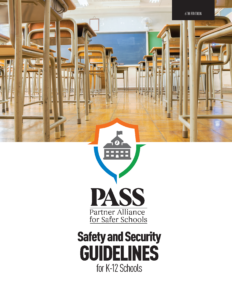Lauren Reese: A Survivor’s Perspective on School Safety
Trigger Warning: This blog contains content about gun violence and the Columbine school shooting. Reader discretion is advised, as it may be distressing for some individuals.
“I don’t want my kids or any child ever to have to feel that anguish. … no one should have to feel that in their lifetime.” —Lauren Reese, Columbine survivor and advocate for mental health awareness and school safety and security

If you’re someone who hasn’t experienced something as traumatic as a school shooting, it’s surprising how vividly Lauren Reese remembers the morning of April 20, 1999. It began like any ordinary day, with her mother dropping her off at Columbine High School. She went to ceramics class and soon found herself covered in clay. Lauren always kept some spare change on hand to use the school’s pay phone, a routine she followed that day. She planned to call her mother, requesting permission to skip science class to clean up.
What happened next was far from routine. Lauren’s life took an unexpected turn around 11 a.m. while she made the usual call home. Suddenly, the sound of gunshots shattered the air, along with the frantic commotion of people fleeing. Looking up, she saw an assailant who aimed a sawed-off shotgun in her direction as he turned the corner.
Without hesitation, she dropped the phone and ran to safety in a nearby bathroom, where she tried her best to make sense of the chaos that had erupted. The situation grew more chaotic as gunshots continued, people screamed, and fire alarms blared. After several minutes of uncertainty, Lauren cautiously emerged from the bathroom.
She returned to the pay phone, but where she once stood was now a shattered moment of violence, the phone dangling by wires from the wall. Somehow her mother’s screams came through the receiver, so she quickly answered. After Lauren explained the situation, her mother urgently told her to run. Without hesitation, Lauren, alongside fellow students, fled to safety. Students helped each other climb over the school’s 6-foot chain-link fence and ran to a nearby park across the street. Afterward, she found a safe place at a golf club’s leasing office, where she once again called her mother.
This tragic shooting, which we’d later learn was also an attempted bombing, claimed 15 lives, including those of the two shooters, and injured more than 20 people. It became the deadliest mass shooting at a U.S. high school until 2018 when the mass shooting at Marjory Stoneman Douglas High School surpassed it.
Learning from Stories
The events at Columbine marked the beginning of a troubling trend that has unfortunately become all too frequent on school campuses nationwide. The significance of remembering these tragic events, like the one that unfolded at Columbine High School, goes beyond just reflecting on history; it highlights the urgent need for heightened awareness and proactive measures to safeguard our schools and communities.
Survivor stories like Lauren Reese’s are invaluable. Lauren (and tragically, many others like her) knows firsthand the emotional and psychological scars that linger long after the headlines have faded. Her story heightens the importance of mental health support and the critical need for effective school safety measures.
At PASS, we believe it’s essential to keep stories like these at the forefront of our minds. They serve as a reminder of the people our door hardware, alarm and video systems, guest badges, and vestibules are designed to protect. This commitment to school safety and security takes on a deeply personal meaning when we hear stories like Lauren’s, where the need for safety is not just an abstract concept but a daily reality.
Parenting and Advocacy After Trauma
Lauren’s journey as a survivor of the Columbine tragedy has been a testament to her resilience. When asked how becoming a parent has changed her view of the world and safety in general, she shared that she has battled post-traumatic stress disorder (PTSD) since Columbine and postpartum depression (PPD) following the birth of her second son. Parenthood has made Lauren more cautious and vigilant, influencing her decision-making and even affecting where she sits in public spaces. She’s deeply committed to keeping her family safe and has become a more proactive parent. She constantly seeks opportunities to help ensure that she and her children—and all children—are well prepared for unexpected situations.
She took a proactive approach when discussing Columbine with her children. She opened up to her oldest son about what she’d experienced when he was six. Four years later, her younger child asked about it, although he still struggled to grasp the full extent of that day. When kids ask questions, Lauren understands the importance of providing honest, age-appropriate answers.
She also uses her experiences to impart valuable lessons to her children, teaching them to be aware of their surroundings and prepare for the unexpected. She finds ways to emphasize, without instilling fear in her children, the importance of seeking safety if an emergency occurs. Her advice for parents? “Use a non-threatening way. Tell them about a mountain lion and compare hiding from one to hiding during an active shooter incident. Make it relatable but not scary,” she shared. Her goal is to ensure that her children always keep their safety at the forefront of their minds in the event of a threat.
Lauren also discussed the concept of common sense with her children, encouraging them to adopt a “See something, say something” mentality. She believes people must trust that gut feeling and speak up when things feel off. She shared a personal example from a visit to a movie theater after the Aurora shooting, where she felt uneasy due to a man with a large backpack in the theater. She reported it to guest services, leading to an officer’s intervention. Although there was no real threat, Lauren sees it as a stark reminder that speaking up is vital today.
The simple act of sending her children to school carries significant meaning for Lauren. It means placing her trust in a system and the hands of others, a fear that she has turned to empowerment. She’s more vocal about school safety and advocates for children. “I don’t want my kids or any child ever to have to feel that anguish. … no one should have to feel that in their lifetime,” said Lauren.
This led her to contact PASS chairman Guy Grace to learn more about the security measures that were in place at her children’s school. He’s also committed to mental health awareness and providing people with the tools to survive similar tragedies and other situations. Over the past few years, she’s spoken about her experience and focused on empowering students with the skills they need to endure and thrive.
Today’s School Safety and Security Efforts
As a concerned parent and survivor, Lauren supports the continuous efforts to improve school safety and security. She recognizes and appreciates the contributions of organizations like PASS, committed professionals dedicating time and expertise to our common cause. Lauren understands the importance of safety measures such as facial recognition, metal detectors, and body tracking cameras, as well as following the PASS Guidelines while advocating for their proper use during emergencies.
She believes in ensuring comprehensive training for all potential scenarios as a top priority. This is a shared value with PASS, of course: adequate training is key for implementing effective safety protocols and harnessing the potential of the technology at a school’s disposal.
Lauren’s story underscores the importance of educating the school community about the latest safety technology and products. We should all advocate that the PASS Guidelines are easily accessible to everyone, including school staff and parents, to encourage a shared responsibility toward a school’s security measures while promoting efficient use.
How Parents Can Take Action
Lauren is steadfast in this simple mantra: Parents are not bystanders; they play a crucial role in ensuring their children’s safety and well-being. Lauren’s story can inspire parents to actively participate in their children’s education by inquiring about the school’s safety procedures and technologies. Parents can help schools prioritize and improve safety measures by voicing their concerns and expectations. Open communication between parents and school authorities creates a shared responsibility for ensuring the safety of students, and they become powerful allies in the PASS mission.
Parents: Team up with other parents and friends! Teamwork strengthens the impact of safety initiatives and becomes a collective force for good. By pooling resources, sharing knowledge, and exchanging experiences, parents can contribute to more effective safety measures. Remember Lauren’s “See something, say something” common-sense mantra. Potential threats are identified and addressed when more people are alert and aware. Parents can actively advocate for school safety and security with these simple practices.
The PASS community can help. In the field, we can remember Lauren’s story and resilient willingness to get involved. Lauren can serve as a powerful example when we meet concerned parents throughout our work.
The Journey Continues
Lauren aims to keep sharing her story and advocating for parent involvement. She dreams of writing a book that details her experience and guides children on staying safe in case of danger. She’s a living example of how improving school safety and security is a community effort that extends beyond the technical and physical aspects. It’s about meeting children’s mental, behavioral, health, wellness, and other needs.
Check out Safe and Sound Schools’ Framework for Comprehensive School Safety Planning & Development to learn more about school safety preparedness strategies.
About PASS
The Partner Alliance for Safer Schools (PASS) is a nonprofit 501(c)(3) bringing together expertise from the education, public safety, and industry communities to develop and support a coordinated approach to making effective and appropriate decisions with respect to safety and security investments. You can download the complete PASS Guidelines or check out our PASS Safety and Security Checklist for quick start tips. These resources—as well as whitepapers on various topics including barricade devices, lockdown drills, and more—are available at no cost.
Categories
- Access Control
- Artificial Intelligence
- Classroom Door Locks
- Crime Prevention Through Environmental Design
- Cybersecurity
- Duress Alarm
- In the News
- Legislation
- Lockdown Drills
- New Technologies
- PASS Advisory Council
- PASS Board of Directors
- PASS Partners
- PASS Recommendations
- Preparedness
- Safe School Week
- Safety & Security Guidelines
- School Safety & Security
- Security Best Practices
- Video Surveillance

Ready to get the Guidelines?
The most comprehensive information available on best practices specifically for securing school facilities, vetted extensively by experts across the education, public safety and industry sectors.
